Yuelu Mountain, a magnificent peak standing on the west bank of the Xiangjiang River, has been the cultural backbone of Hunan since ancient times. Its name originates from an ancient description in the Nanyue Records during the Liu Song period of the Southern and Northern Dynasties.
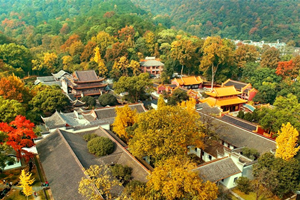 Yuelu Mountain
Yuelu Mountain
The scenic area is rich in vegetation, with 977 species of plants, mainly subtropical evergreen broad-leaved forests and warm coniferous forests, serving as a cradle for many rare and endangered trees. Yuelu Mountain is also famous for the coexistence of Confucianism, Buddhism, and Taoism, and has gathered the wisdom and efforts of ancient scholars, monks, and literati. Within the 5.28 square kilometers of the Yuelu Mountain Scenic Area, there are numerous scenic spots such as Yuelu Academy, Aiwan Pavilion, and Lushan Temple, each carrying profound historical and cultural connotations.
Aiwan Pavilion is particularly beautiful in late autumn, surrounded by fiery red maples that glow brilliantly, complementing the poetic atmosphere depicted in poetry. Yuelu Academy is a major attraction in Yuelu Mountain. As one of the four major ancient academies in China, it has undergone the Song, Yuan, Ming, and Qing dynasties, and was named Hunan University in 1926. The courtyard layout within the academy complements the greenery, exuding an ancient charm that makes you feel as if you have traveled through time, returning to the ancient academy filled with the sounds of reading. The couplet at the entrance has been passed down through the ages and has become a landmark of Yuelu Academy.
Moreover, Yuelu Mountain is closely connected with the Juzizhou scenic area (Orange Isle), which has become a beautiful calling card of Changsha and even Hunan Province. Here, the history and culture intertwine. Whether you wish to savor the refined atmosphere of Yuelu Academy or stroll along the riverside at the tip of Orange Island, you are destined to find a sense of tranquility and enlightenment deep within your soul.
Historical Highlights You Can't Miss
Yuelu Academy
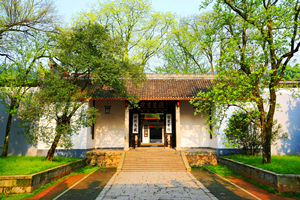 Yuelu Academy
Yuelu Academy
Nestled at the foot of the picturesque Yuelu Mountain, this ancient academic institution has endured thousands of years of vicissitudes, yet it still shines brilliantly, narrating its enduring legend. The history of Yuelu Academy is akin to a profound epic, witnessing the prosperity and development of Chinese civilization. Since its establishment in the Northern Song Dynasty, it has borne the sacred mission of cultivating talents and inheriting culture. Through the alternation of dynasties such as the Song, Yuan, Ming, and Qing, Yuelu Academy has remained standing tall, becoming a dazzling jewel of the ancient Chinese academy system.
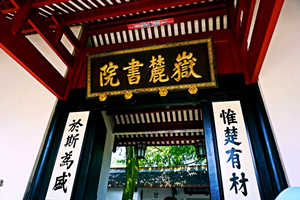 Yuelu Academy
Yuelu Academy
In the long river of time, Yuelu Academy stands as a wise elder, attracting countless students eager for knowledge. Here, they delve into the classics of Confucianism, discuss the laws of nature, and pursue truth and wisdom. The scholars of Yuelu Academy are not only erudite but also possess noble character and lofty aspirations. With their wisdom and talent, they have made outstanding contributions to the prosperity and development of the Chinese nation.
As you wander through the academy, you feel as if you have immersed in a world full of wisdom. The paths paved with green slabstones, the elegant pavilions and towers, the verdant ancient trees and famous plants all narrate the long history and profound cultural heritage of Yuelu Academy.
Aiwan Pavilion
Aiwan Pavilion was originally built by Luo Dian, the head of Yuelu Academy during the Qing Dynasty. Initially named Red Leaf Pavilion, it was later renamed Aiwan Pavilion based on the poem line "Stopped the coach to enjoy the late maple woods; Frosty leaves redder than the February flowers" by Du Mu, a poet in the late Tang Dynasty. This renaming not only gave the pavilion a cultural background, but also made it an excellent place to admire the maple leaves on Yuelu Mountain.
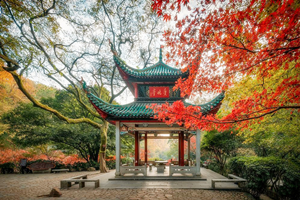 Aiwan Pavilion
Aiwan Pavilion
As an integral part of Yuelu Academy, Aiwan Pavilion is also an important carrier of traditional Chinese culture. Inside it, you can feel the elegance and sentiment of ancient scholars and poets, as well as appreciate the unique charm of traditional Chinese architecture. Furthermore, Aiwan Pavilion serves as a significant venue for cultural exchange and inheritance, where numerous cultural activities and academic discussions are held.
Today, Aiwan Pavilion has become a cultural icon of Changsha City. It attracts tourists from all over the world with its ancient and elegant architectural style, profound historical heritage, and unique cultural connotations. Walking through Aiwan Pavilion, you feel as if you are sharing the beautiful scenery and cultural charm of Yuelu Mountain with those literary scholars and poets thousands of years ago.
Lushan Temple
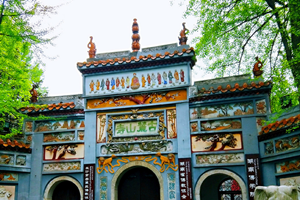 Lushan Temple
Lushan Temple
Nestled among the mountains and forests, Lushan Temple is not only a pilgrimage site for Buddhist believers but also a treasure trove of historical significance. The temple's architectural style is quaint and elegant, with red walls and dark tiles exuding a dignified beauty. The Buddha statues within the temple are solemn and majestic, inspiring awe and reverence. Moreover, the towering ancient trees surrounding the temple, lush and verdant, add an extra sense of serenity and peace.
The history of Lushan Temple dates back to the Southern Dynasty. According to legend, a venerable monk traveled here and, upon seeing the lush green mountains and clear waters filled with spiritual essence, decided to establish a temple and cultivate his spiritual practice in this place. Thus, Lushan Temple came into being and became the center of local Buddhist culture. After thousands of years of vicissitudes, Lushan Temple has witnessed historical changes and carried the faith and hope of countless believers.
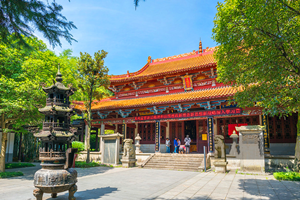 Lushan Temple
Lushan Temple
The cultural significance of Lushan Temple is not only embodied in its architecture and legends, but also in the profound Buddhist philosophy it holds. Buddhism emphasizes karmic retribution and compassion, which are fully expressed in Lushan Temple. Here, leaving far away worldly affairs, you can pursue a pure inner peace. The temple offers a moment of tranquility in the midst of a busy life.
At Lushan Temple, you can appreciate the charm of ancient architecture, feel the depth of Buddhist thought, and even delve into the traces of history and the allure of legends. Whether you are a history enthusiast or a cultural pursuer, Lushan Temple is a unique and desirable destination.
Travel Information
Location: Hunan University campus, Yuelu District, Changsha
Open hours:
7:00 am -- 22:00 pm from May 1 to October 31;
6:00 am -- 22:00 pm from November 1 to April 31 the following year.
Recommended visiting hours: 3 Hours
Admission: Free of Charge, RMB 40 for Yuelu Academy
Internal transportation:
park buses (8:30am -- 17:00pm)
RMB 20
cable car (9:00am -- 17:00pm)
RMB 30 go up; RMB 25 go down; RMB 50 go up and down
slideway (9:00am -- 17:00pm)
RMB 35 go down; RMB 30 (under 12 years old) go down
Note: The above information is for reference only. The specific prices and preferential policies may be adjusted according to the season, holidays and other factors, we recommend tourists to check the latest information through official channels before travel.




































